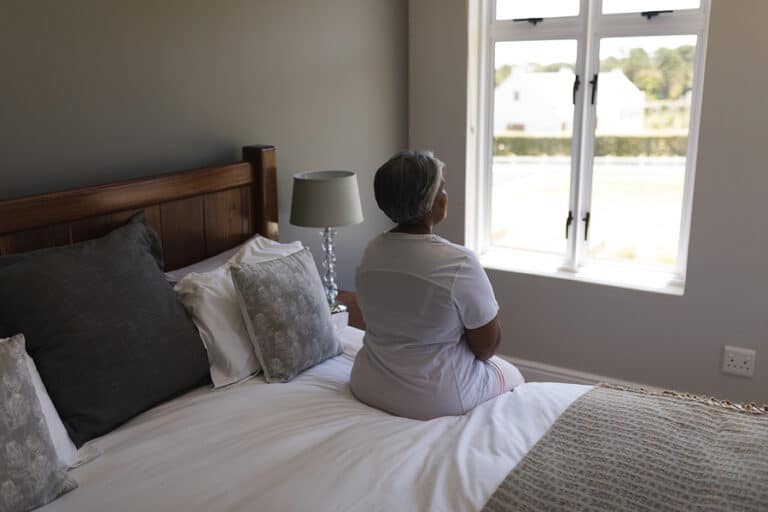Taking care of a loved one who has Alzheimer’s disease can be challenging. However, with Alzheimer’s care in place, family members gain a better understanding of what care is needed, including the need to build “quiet times” into each day. Not only can these peaceful times provide relaxation, but they are also necessary for handling the complexities of the illness.
Quiet Times Reduce Anxiety and Overstimulation
Seniors with Alzheimer’s are especially susceptible to overstimulation. Their senses can get overwhelmed by crowded spaces, loud noises, and excessive activity, which can increase their uneasiness, anxiety, and confusion. Calm moments provide a break from these stresses and create a calm atmosphere that allows the mind to unwind.
Quiet Times Enhance Mental Performance
Alzheimer’s disease affects cognitive functioning, making it harder for seniors to absorb information, recall specifics, and make decisions. Frequent calm periods provide the brain with a respite from cognitive demands and allow it to heal. Even brief, quiet times can help lower the cognitive load, which allows seniors to more readily participate in activities scheduled later in the day.
Quiet Times Encourage Emotional Health
Coping with Alzheimer’s disease can be emotionally draining. Emotional distress might result from the frustration of forgetting, confusion about their surroundings, and the overall dread many seniors feel. The calmness of quiet moments provides a haven that calms these feelings and fosters a sense of security and comfort. As part of Alzheimer’s care, meditation, calming music, or just sitting still in a peaceful environment are all positive ways to build quiet into seniors’ lives.
Quiet Times Encourage Better Sleep
Seniors with Alzheimer’s frequently experience sleep disruptions, with many of them having trouble sleeping or staying asleep through the night. A day with planned calm periods can greatly enhance the quality of their sleep. These peaceful times can help control sleep patterns and result in more restorative sleep at night by preventing overstimulation in the late afternoon and letting the brain wind down.
Quiet Times Encourage Staying Present
During quiet periods, seniors can be encouraged to engage in mindfulness exercises, which can be quite helpful, especially when they are anxious. Promoting mindfulness can help reduce the anxiety that comes with memory loss and confusion about the past or future by encouraging attention to the present moment. During these quiet moments, simple mindfulness exercises like breathing exercises or taking in the scenery can help cultivate a sense of presence and offer mild cerebral stimulation that is calming rather than taxing.
It’s important to note that these quiet times can also be beneficial for those caring for seniors as well as the seniors themselves. That’s because a break from the stressors of life allows for a reset, which can be quite beneficial when emotions become overwhelming.
For seniors with Alzheimer’s disease, quiet times are much more than just short periods of time during the day. They are vital resources for symptom management, mental health enhancement, cognitive function improvement, and more. Additionally, proper Alzheimer’s care includes these quiet times as a way of helping loved ones and seniors navigate their journey with more comfort, dignity, and grace.
Sources:
https://www.alz.org/help-support/caregiving/daily-care/daily-care-plan
If you or an aging loved one are considering Alzheimer’s care in Dover, MA, please contact the caring staff at PlatinumCare + today. Call (617) 237-0867.
PlatinumCare + was born out of the desire and passion to provide the very best home health care possible in Brookline, Dover, Newton, Needham, Watertown, Weston, Cambridge, Lincoln, Sudbury, Belmont, Boston MA, and surrounding areas.
Timothy’s journey spans decades of Managerial experience in IT Operations, Support, and Financial Management, where he honed his skills in creating seamless and technologically efficient systems. His expertise ensures that Platinum Care + operates with precision and reliability, providing a backbone of support that empowers our care services to run effortlessly. His strategic mindset allows us to integrate technology and care to enhance our clients’ experiences and the firm at large.
Brenda brings a wealth of experience in client relations, healthcare services, and sales management. Her innate ability to connect with people and understand their needs drives our client-focused approach. Brenda’s passion for nurturing relationships ensures that every interaction with Platinum Care + is warm, attentive, and deeply respectful of each client’s unique journey.
Both come from a storied and extensive background where community-based homecare was the norm. In their communities, caring for aging or ailing family members was a collective responsibility shared with compassion and unwavering support. This ethos of community care, where love, sacrifice, and empathy are paramount, forms the core of how Platinum Care + approaches homecare. Loving care, deep compassion and comfort.
By blending their unique skills and experiences, Timothy and Brenda have created a sanctuary of care beyond mere service delivery. Their shared mission is to cultivate an environment where clients feel empowered, understood, and cherished. At Platinum Care +, we are more than just caregivers; we are partners in your well-being journey, dedicated to making every moment meaningful and enriched with compassion.
Platinum Care + is where your health and happiness are our greatest priorities. Our commitment to unmatched excellence is reflected in every smile, every touch, and every service we provide.
- How Companion Care at Home May Help Seniors Feel Less Anxious - May 9, 2025
- Making Connections, One Visit at a Time - April 11, 2025
- Six Reasons Driving May Become Too Dangerous for Your Senior - March 27, 2025



